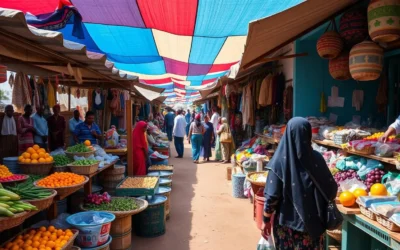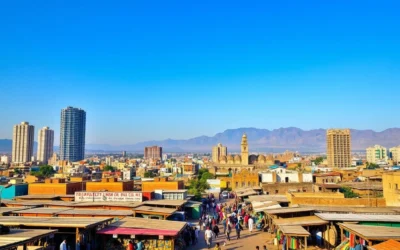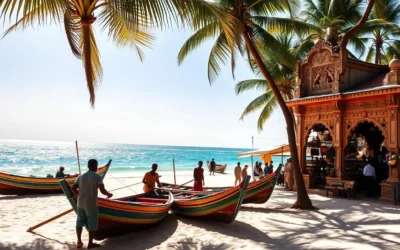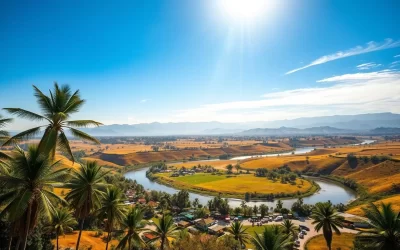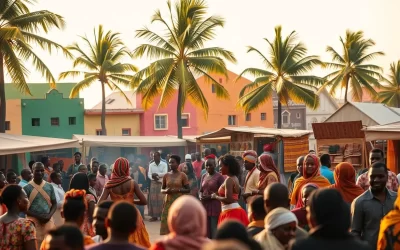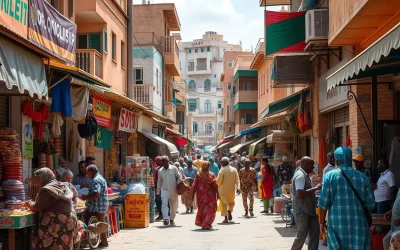Did you know Somalia has over 3,300 km (2,050 mi) of coastline – the longest in mainland Africa – with untouched beaches rivaling the Maldives? Despite its challenging reputation, Somalia is gradually reopening to intrepid travelers, offering extraordinary experiences for those willing to venture beyond conventional destinations. In 2024, foreign visitors to Somalia increased by 50%, reaching over 10,000 adventurous souls discovering this misunderstood corner of the Horn of Africa.
Getting There & Planning Your Journey
Mogadishu’s stunning coastline offers some of Africa’s most pristine beaches
Traveling to Somalia requires careful planning and preparation. Most international visitors arrive via Mogadishu’s Aden Adde International Airport, with limited flights operated by Turkish Airlines, Ethiopian Airlines, and Kenya Airways. Alternative entry points include Hargeisa in Somaliland (the self-declared independent region) and Bosaso in Puntland.
Before planning your trip, check the latest travel advisories from your government, as security situations can change rapidly. Most nationalities require a visa to enter Somalia, which can be arranged through Somali embassies or consulates abroad. For Somaliland, visas are issued on arrival at Hargeisa Airport or at the land borders with Ethiopia and Djibouti.
Essential preparations include:
- Comprehensive travel insurance that specifically covers Somalia
- Vaccinations including yellow fever, hepatitis A and B, typhoid, and antimalarial medication
- Arranging reliable local guides and transportation in advance
- Multiple copies of important documents
- Sufficient cash (US dollars are widely accepted)
Ready to Start Your Somali Adventure?
Find the best flight deals to Somalia and begin your journey to this fascinating destination.
Best Time to Visit Somalia
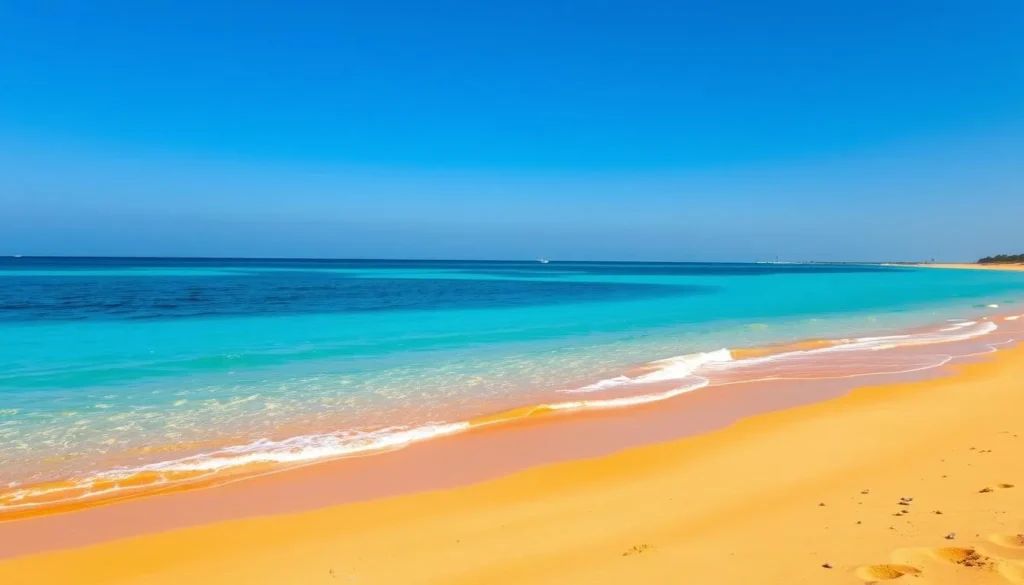
Somalia experiences a hot, arid climate throughout most of the year, with distinct wet and dry seasons that vary slightly by region. Planning your visit during the optimal months can significantly enhance your experience.
Recommended Months to Visit
The best time to visit Somalia is during the dry season, which typically runs from December to February. During these months, you’ll enjoy warm temperatures averaging 25-30°C (77-86°F) with minimal rainfall, clear skies, and more comfortable humidity levels. This period is ideal for exploring beaches, historical sites, and urban areas.
Seasons to Avoid
Avoid traveling during the two rainy seasons:
- Gu rains (April to June): The main rainy season brings heavy downpours that can cause flooding and make travel difficult, especially in southern regions.
- Deyr rains (October to November): The shorter rainy season still brings significant precipitation that can disrupt travel plans.
The hottest months (March to May) see temperatures regularly exceeding 35°C (95°F) with high humidity along the coast, making outdoor exploration challenging.
| Season | Months | Weather | Recommendation |
| Jilaal (Dry) | December-February | Warm, dry, 25-30°C (77-86°F) | Highly Recommended |
| Gu (Main Rainy) | April-June | Hot, humid, heavy rain | Not Recommended |
| Hagaa (Second Dry) | July-September | Hot, moderately dry | Acceptable |
| Deyr (Second Rainy) | October-November | Warm, moderate rain | Not Ideal |
Getting Around Locally
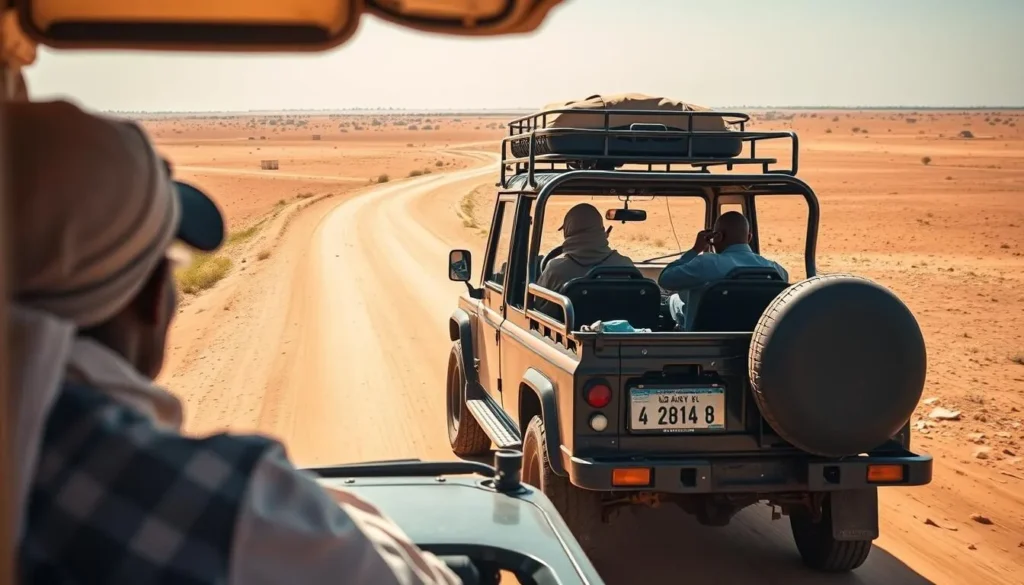
Transportation in Somalia presents unique challenges and considerations. Due to security concerns and limited infrastructure, getting around requires careful planning.
Transportation Options
- Private Vehicles with Drivers: The safest and most reliable option. Hiring a 4×4 vehicle with an experienced local driver who knows the terrain and security situation is highly recommended. Expect to pay $70-150 per day depending on the region and distance.
- Shared 4x4s: Between major towns, shared 4×4 vehicles operate as informal public transportation. While more affordable ($10-50 depending on distance), they can be crowded and follow unpredictable schedules.
- Local Buses: Available in major cities like Mogadishu and Hargeisa. These are very inexpensive (often under $1) but can be crowded and are generally not recommended for tourists due to security concerns.
- Domestic Flights: Several airlines including Jubba Airways and African Express operate domestic flights between major cities. This is the safest way to cover long distances within Somalia.
Safety Tip: Always arrange transportation through trusted sources such as your hotel or a reputable tour operator. Never hail unmarked taxis or accept rides from strangers.
Explore Somalia with Confidence
Book a reliable rental vehicle with a driver to navigate Somalia safely.
Where to Stay in Somalia
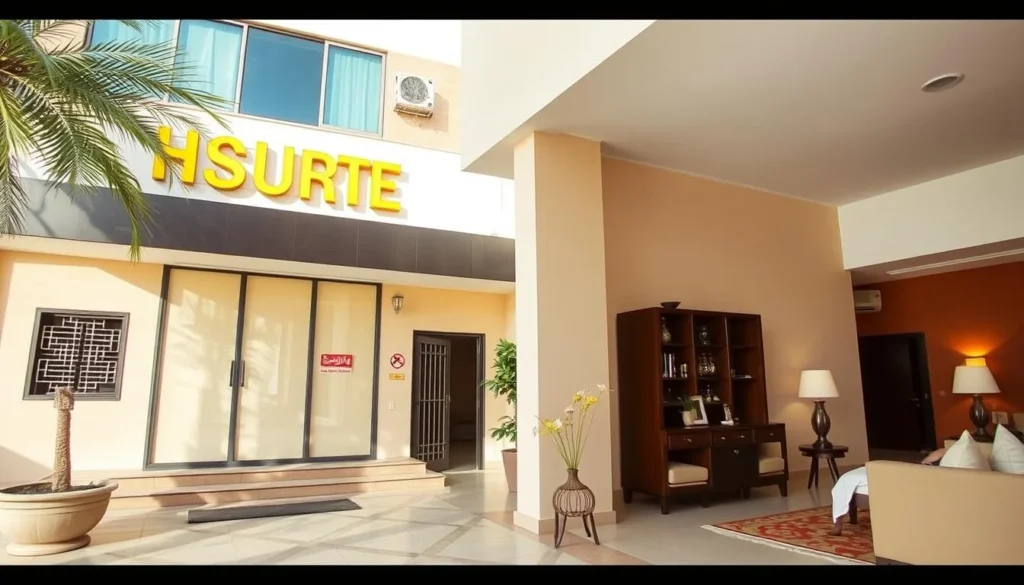
Accommodation options in Somalia are limited compared to more established tourist destinations, but you’ll find a range of choices in major cities. Security is a primary consideration for all properties, with most reputable hotels featuring robust security measures.
Mogadishu Accommodations
As the capital city, Mogadishu offers the widest range of accommodation options:
- Peace Hotel: A popular choice among journalists and NGO workers, offering secure compound-style accommodation with good amenities. Rates start around $100 per night including airport transfers and meals.
- Jazeera Palace Hotel: A mid-range option with comfortable rooms, restaurant, and strong security protocols. Expect to pay $120-150 per night.
- SYL Hotel: One of the more upscale options in Mogadishu, located near the beach with a swimming pool and multiple dining options. Rates from $150 per night.
Hargeisa (Somaliland) Accommodations
Hargeisa offers more budget-friendly options with good standards:
- Oriental Hotel: A popular budget option in the city center with basic but clean rooms from $15-20 per night.
- Maamus Hotel: Slightly more upscale accommodation with better amenities, located a short distance from downtown. Rooms from $25-40.
- Ambassador Hotel: One of the better hotels in Hargeisa with restaurant, Wi-Fi, and air conditioning. Rates from $50 per night.
Other Regions
In smaller cities and coastal areas:
- Berbera: Barwaqo Hotel offers simple rooms near the beach for around $10-15 per night.
- Bosaso: Several basic hotels catering primarily to business travelers, with rates from $30-50.
- Zeyla: Very limited options, with Kaboode Guest House being one of the few options at around $15-20 per night.
Find Your Perfect Stay in Somalia
Book secure and comfortable accommodation for your Somali adventure.
Dining & Local Cuisine
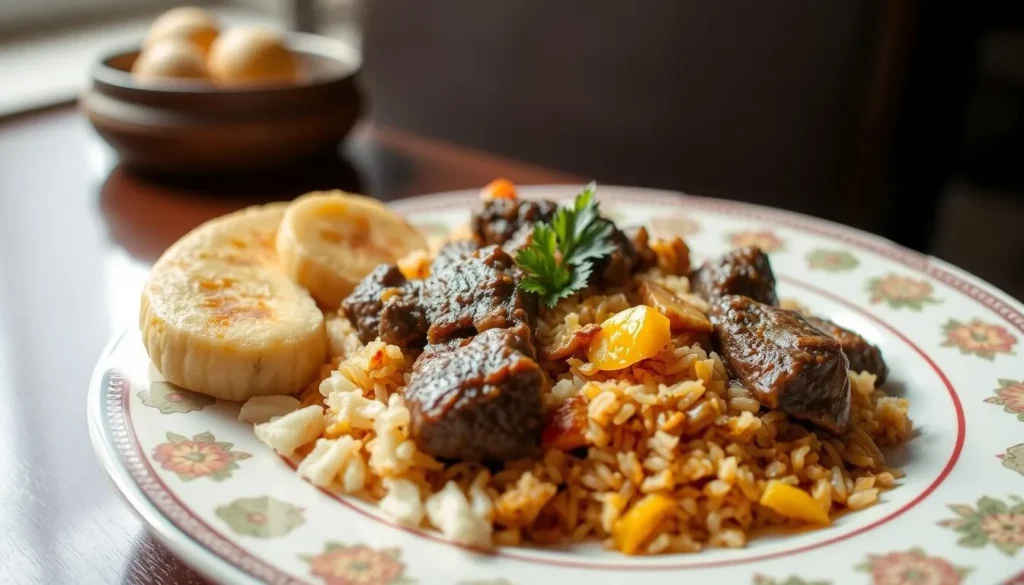
Somali cuisine reflects the country’s position at the crossroads of African, Arab, and Indian influences, creating a unique culinary tradition worth exploring. Meals are typically centered around rice or pasta dishes, complemented by meat (primarily goat, camel, or fish along the coast) and flavored with a distinctive blend of spices.
Must-Try Somali Dishes
- Bariis Iskukaris: Spiced rice cooked with meat, vegetables, and a blend of cardamom, cloves, cumin, and cinnamon. Often served with banana on the side – a uniquely Somali combination.
- Canjeero: A sourdough pancake similar to Ethiopian injera but smaller and thinner. It’s a breakfast staple often served with honey, ghee, or stews.
- Sambusa: Triangular pastries filled with spiced meat or vegetables, similar to samosas but with a Somali spice blend.
- Maraq: A rich, flavorful soup made with meat, vegetables, and spices, typically served as a starter or alongside main dishes.
- Muqmad: Dried preserved meat (usually camel or beef) that’s been spiced and can be stored for long periods – a traditional nomadic food.
- Xalwo: A sweet confection made with sugar, cardamom, nutmeg, and ghee, often served at celebrations and special occasions.
Dining Etiquette
When enjoying Somali cuisine, keep these cultural considerations in mind:
- Meals are traditionally eaten with the right hand (the left hand is considered unclean)
- It’s customary to wash hands before and after meals
- Refusing food or drink may be considered impolite
- During Ramadan, avoid eating, drinking, or smoking in public during daylight hours
Where to Eat
In major cities like Mogadishu and Hargeisa, you’ll find a range of dining options:
- The Village (Mogadishu): Popular restaurant serving traditional Somali dishes in a secure environment
- China-som (Hargeisa): One of the more upscale restaurants frequented by local celebrities and expatriates
- Al Hayaat (Berbera): Excellent seafood restaurant serving fresh catches from the Gulf of Aden
- Honey Café (Hargeisa): Specializes in honey-based drinks and light meals
Attractions & Sightseeing
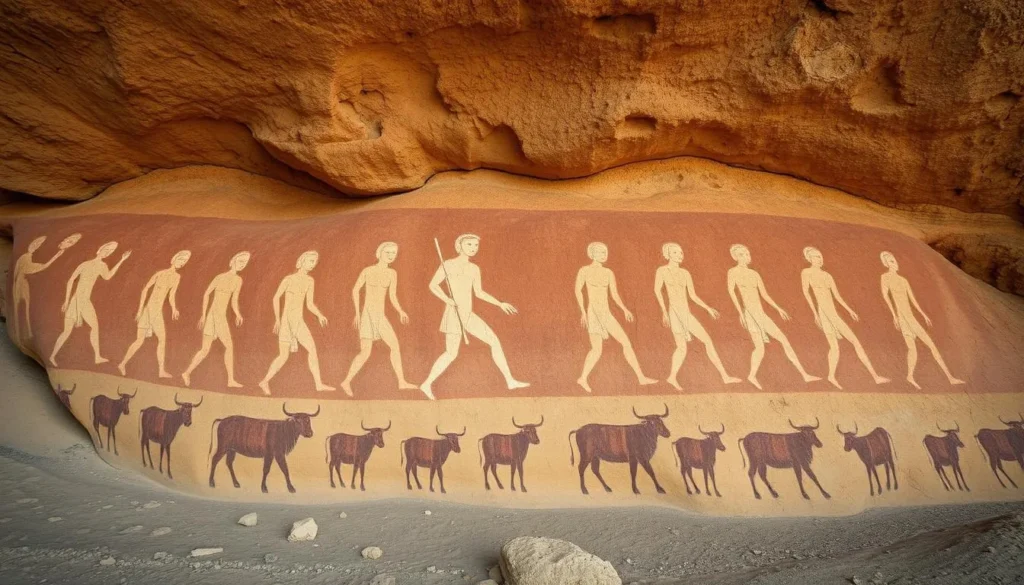
Despite its challenging reputation, Somalia boasts remarkable historical sites, natural wonders, and cultural attractions that reward adventurous travelers. Here are the top attractions worth exploring:
Historical & Archaeological Sites
- Las Geel: One of Africa’s most important and well-preserved rock art sites, dating back 5,000-10,000 years. Located near Hargeisa in Somaliland, these cave paintings depict early pastoral life with remarkable detail and vibrant colors.
- Zeila: An ancient port city mentioned in Greek documents from 2,000 years ago. Visit the 7th-century Masjid al-Qiblatayn mosque, one of the oldest in Africa.
- Mogadishu Old Town: Explore the historic architecture influenced by centuries of Arab, Persian, Indian, and European traders.
- Taleh: The former capital of the Dervish State, featuring the largest Dhulbahante garesa (fortress) complex.
Natural Attractions
- Berbera Beaches: Pristine white sand beaches along the Gulf of Aden with crystal clear waters ideal for swimming.
- Cal Madow Mountains: Dramatic mountain range in northern Somalia with diverse ecosystems, hiking opportunities, and the Lamadaya waterfalls.
- Lag Badana National Park: Somalia’s oldest national park featuring diverse wildlife including elephants, lions, and numerous bird species.
- Daallo Forest: A mountainous area with unique flora and fauna, offering spectacular views and hiking opportunities.
Urban Experiences
- Mogadishu Cathedral: Though damaged during the civil war, this Italian-built cathedral remains an important historical landmark.
- Hargeisa Camel Market: One of the largest livestock markets in the Horn of Africa, offering a fascinating glimpse into traditional commerce.
- Bakara Market (Mogadishu): A bustling market where you can find everything from textiles to electronics.
- The War Memorial (Hargeisa): Features a MiG fighter jet that symbolizes Somaliland’s struggle for independence.
Experience Somalia’s Hidden Treasures
Book guided tours to Somalia’s most fascinating attractions with experienced local guides.
Museums, Cultural Spots & Festivals
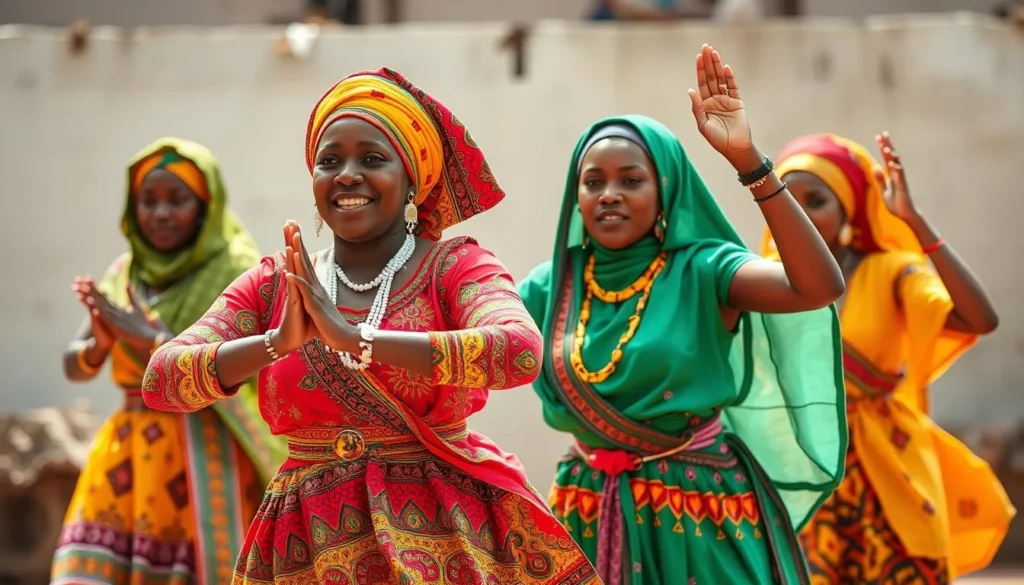
Somalia’s rich cultural heritage is preserved in its museums, cultural centers, and vibrant festivals. These cultural experiences offer valuable insights into the country’s history, traditions, and artistic expressions.
Museums & Cultural Centers
- National Museum of Somalia (Mogadishu): Recently reopened after being closed during the civil war, the museum houses archaeological artifacts, historical documents, and traditional crafts that showcase Somalia’s rich heritage.
- Hargeisa Cultural Center: A hub for cultural activities including art exhibitions, poetry readings, and musical performances. The center also houses a small museum and library.
- Saryan Museum (Hargeisa): Displays artifacts from Somaliland’s struggle for independence and cultural items representing nomadic life.
- Mogadishu Book Fair: An annual event that brings together authors, publishers, and readers to celebrate Somali literature and promote reading culture.
Traditional Arts & Crafts
Somalia has a rich tradition of craftsmanship, including:
- Textile Weaving: Traditional fabrics with geometric patterns used for clothing and home decorations
- Leatherwork: Camel leather crafts including sandals, bags, and decorative items
- Woodcarving: Intricate designs on household items and architectural elements
- Pottery: Traditional clay vessels with distinctive patterns and shapes
Festivals & Celebrations
If your visit coincides with these events, they offer unique cultural experiences:
- Independence Day (June 26 in Somaliland, July 1 in Somalia): Celebrated with parades, music, and cultural performances
- Eid al-Fitr and Eid al-Adha: The two major Islamic festivals celebrated with special prayers, family gatherings, and feasting
- Somali Week Festival: Held annually in Hargeisa, featuring poetry competitions, music performances, and art exhibitions
- Hargeysa International Book Fair: A major cultural event bringing together writers, artists, and intellectuals from across the Horn of Africa and beyond
Map of Somalia showing major cities and points of interest
Sports, Nature & Outdoor Experiences
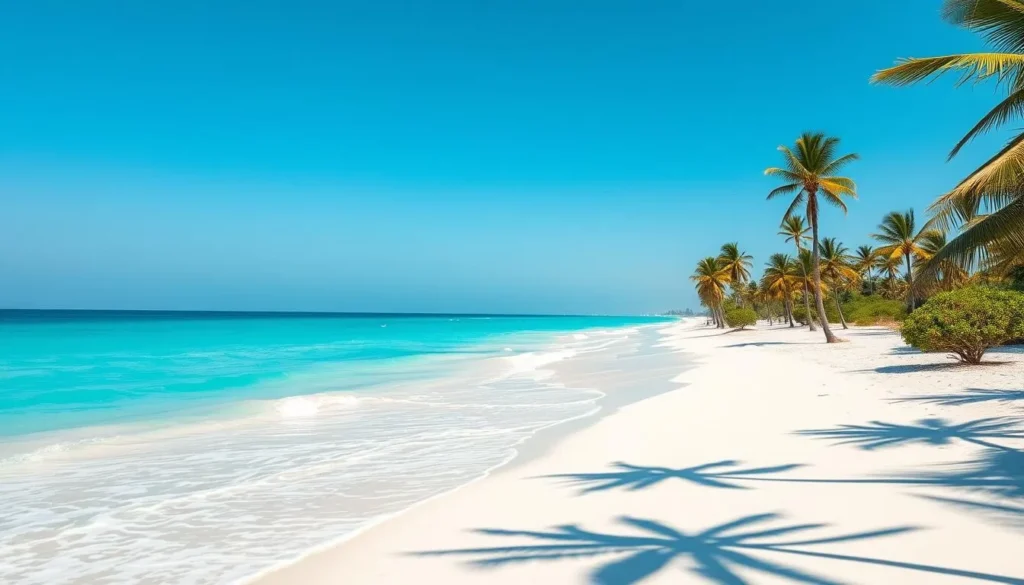
Somalia’s diverse landscapes offer numerous opportunities for outdoor adventures and nature experiences. From pristine beaches to rugged mountains, the country’s natural beauty provides a stunning backdrop for various activities.
Beach Activities
With Africa’s longest coastline, Somalia offers exceptional beach experiences:
- Lido Beach (Mogadishu): The most popular beach in the capital, now experiencing a renaissance with new restaurants and facilities
- Berbera Beaches: Pristine stretches of white sand along the Gulf of Aden, perfect for swimming and relaxation
- Kismayo Beaches: Known for beautiful scenery and rich marine life, ideal for fishing and snorkeling
- Bosaso Coastline: Offers opportunities for kitesurfing during the windy season (October to April)
Hiking & Mountain Exploration
- Cal Madow Range: Somalia’s highest mountains offer spectacular hiking trails through diverse ecosystems
- Daallo Forest: A mountainous area with unique flora and fauna, offering scenic hiking routes
- Golis Mountains: Dramatic landscapes with opportunities for exploration and photography
Wildlife Viewing
Though infrastructure is limited, Somalia has several areas for wildlife observation:
- Lag Badana National Park: Home to elephants, lions, giraffes, and numerous bird species
- Kismayo National Park: Features diverse wildlife including various antelope species
- Hobyo Grasslands: Important habitat for the endangered Somali wild ass and various bird species
Traditional Sports
Experience Somalia’s sporting culture:
- Camel Racing: A traditional sport with deep cultural significance, occasionally held in rural areas
- Football (Soccer): The most popular sport in Somalia, with matches played in Mogadishu and other major cities
- Traditional Wrestling: Demonstrations of this historic sport can sometimes be seen at cultural events
Set Sail from Somalia’s Historic Ports
Explore cruise options departing from Mogadishu and other Somali ports.
Safety, Etiquette & Local Customs
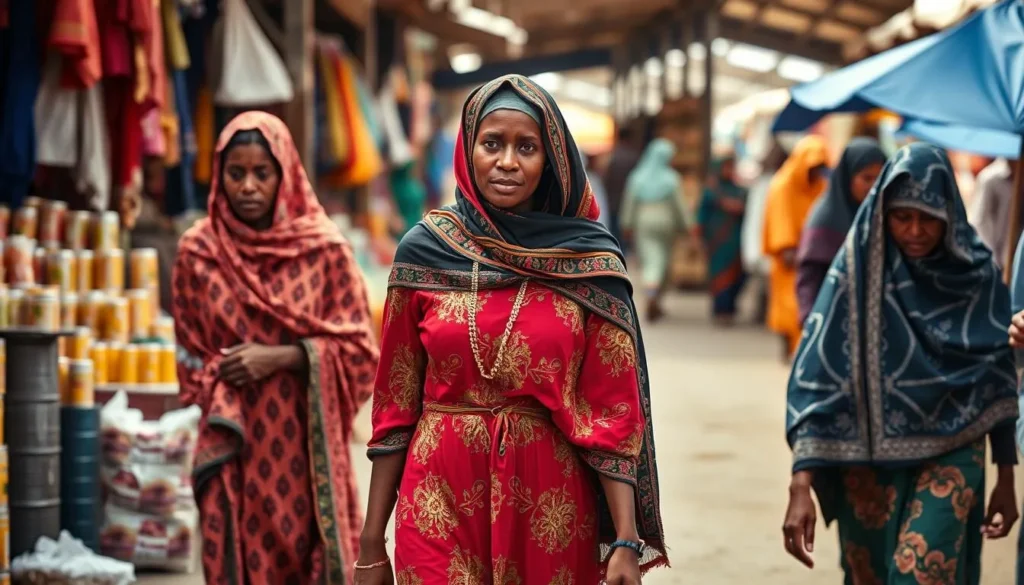
Understanding local customs and safety considerations is essential for a respectful and secure visit to Somalia. The country has complex security challenges, but with proper preparation and cultural awareness, visitors can navigate these challenges effectively.
Safety Considerations
Important: Somalia’s security situation varies significantly by region. Always check the latest travel advisories from your government before planning your trip and consider hiring security personnel in higher-risk areas.
- Somaliland (the self-declared independent region in the northwest) is generally considered the safest area for travelers
- Mogadishu has improved in security but still requires caution and preferably local guides
- Rural areas and southern regions may present higher security risks
- Avoid traveling at night, particularly outside major cities
- Use reputable hotels with security measures in place
- Register with your embassy upon arrival
Cultural Etiquette
Somalia is a conservative Muslim society with specific cultural norms:
- Dress Code: Both men and women should dress modestly. Men should wear long pants, and women should cover their shoulders, arms, and legs. In more conservative areas, women may consider wearing a headscarf.
- Greetings: The traditional greeting is “Assalamu alaikum” (Peace be upon you). Handshakes are common among men, but men should wait for women to extend their hand first.
- Photography: Always ask permission before photographing people. Avoid photographing government buildings, military installations, or security checkpoints.
- Religious Customs: Respect prayer times and religious practices. During Ramadan, avoid eating, drinking, or smoking in public during daylight hours.
Local Customs
- Khat: Chewing khat (a mild stimulant leaf) is a common social activity, particularly in the afternoons. While legal in Somalia, it’s illegal in many other countries.
- Hospitality: Somalis are known for their hospitality. If invited to a home, bringing a small gift is appreciated, but avoid alcohol as it’s prohibited.
- Communication: Direct criticism or confrontation is generally avoided. Communication tends to be indirect and diplomatic.
- Time: “Somali time” is flexible, and punctuality is not always expected in social situations (though it’s still appreciated).
Practical Travel Tips
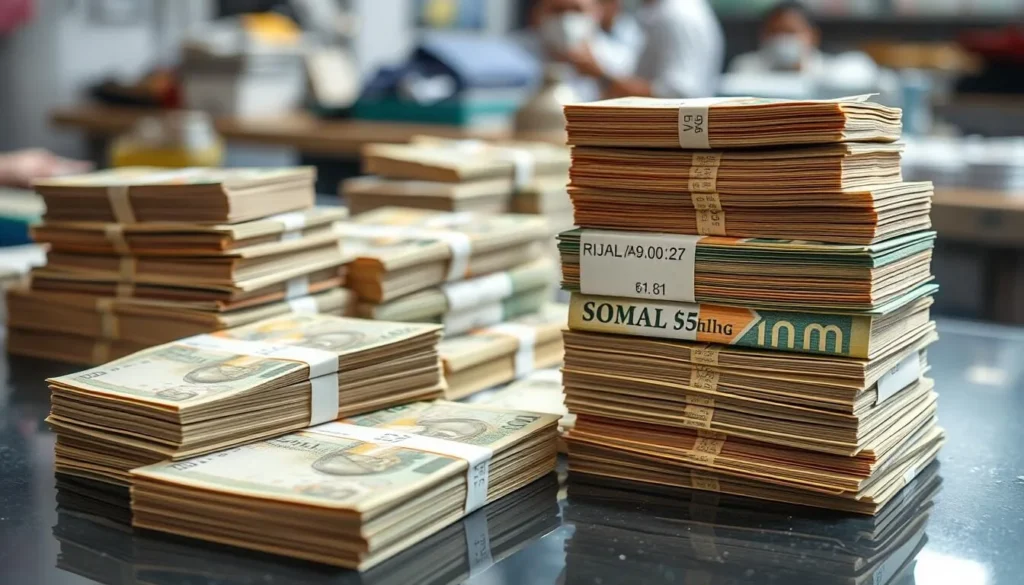
These practical tips will help you navigate the unique challenges of traveling in Somalia and ensure a smoother experience.
Money & Currency
- Currency: The Somali Shilling (SOS) is the official currency, but US dollars are widely accepted and preferred for larger transactions
- Cash Economy: Somalia operates primarily on cash; credit cards are rarely accepted outside high-end hotels in Mogadishu
- Money Exchange: Currency exchange services are available in markets and cities, with money changers displaying stacks of Somali Shillings
- Mobile Money: Services like EVC Plus and Zaad are widely used by locals and can be useful for smaller transactions
Communication
- SIM Cards: Local SIM cards are readily available and affordable from providers like Hormuud and Telesom
- Internet: 4G service is available in major cities, though connection speeds vary
- Language: Somali is the official language, with Arabic also widely spoken. English is common among educated Somalis and in the tourism industry
- Useful Somali Phrases:
- Hello – Salaam aleikum
- Thank you – Mahadsanid
- Yes – Haa
- No – Maya
- How much? – Immisa?
Health & Hygiene
- Healthcare facilities are limited; bring a comprehensive medical kit
- Drink only bottled or purified water
- Use sunscreen and stay hydrated in the hot climate
- Consider antimalarial medication, especially when traveling in southern regions
Packing Essentials
- Conservative, lightweight clothing
- Sturdy walking shoes
- Power bank and universal adapter
- First aid kit with prescription medications
- Insect repellent
- Sunscreen and hat
- Hand sanitizer and wet wipes
Ready for Your Somali Adventure?
Start planning your journey to this fascinating destination with our trusted travel partners.
Conclusion
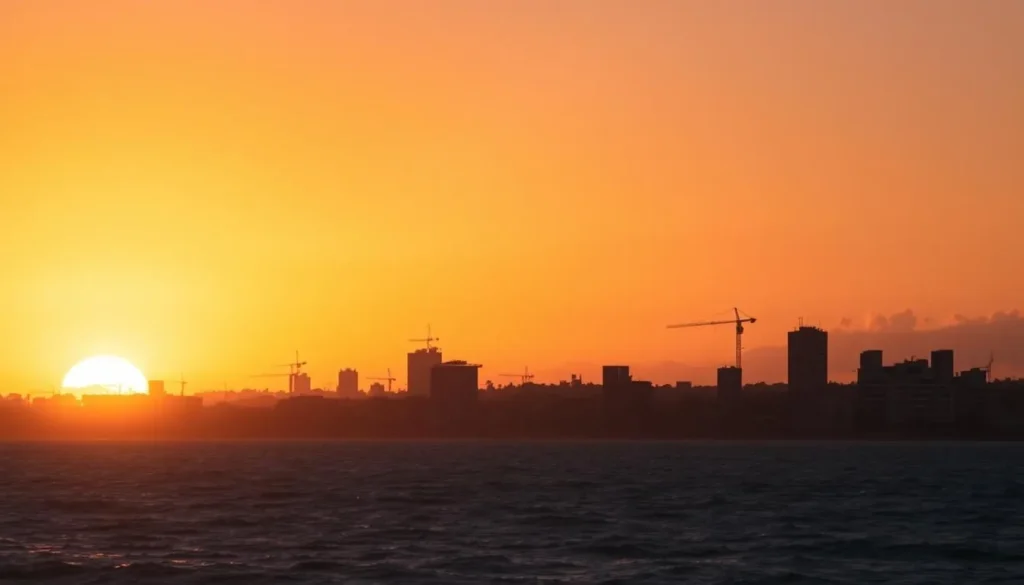
Somalia offers intrepid travelers a rare opportunity to explore a destination that few have experienced. From the ancient rock art of Las Geel to the pristine beaches along Africa’s longest coastline, the country rewards visitors with authentic cultural experiences and natural beauty that remain largely untouched by mass tourism.
While traveling in Somalia requires careful planning and awareness of security considerations, those who venture to this misunderstood corner of the Horn of Africa will discover warm hospitality, rich cultural traditions, and landscapes of striking beauty. As the country continues its gradual journey toward stability, now is a unique moment to experience Somalia’s treasures before the rest of the world discovers them.
From ancient port cities to dramatic mountain ranges, Somalia’s diverse attractions offer something for every adventurous traveler. Whether you’re exploring the bustling markets of Mogadishu, marveling at millennia-old cave paintings, or relaxing on pristine beaches, your journey through Somalia will provide memories and stories that few other destinations can match.
The above is subject to change.
Check back often to TRAVEL.COM for the latest travel tips and deals.

